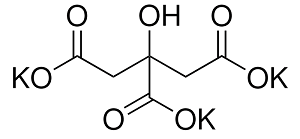Lithium Battery & Electrolyte Chemicals
Pharmaceutical & Fine Chemicals

Potassium citrate is a chemical compound with various industrial, commercial, and pharmaceutical applications.
Product:
Potassium Citrate
CAS:
866-84-2
Synonym:
Tripotassium citrate; Citric acid, tripotassium salt; Tripotassium 2-hydroxypropane-1,2,3-tricarboxylate
Structure:

Appearance
White crystalline powder
Boiling point
230 °C
Density
1.98 g/cm3
Melting point
180 °C
Molecular Weight
306.39
Odor
Odorless
Purity
99%
Key applications
A few of the grades available are listed below:



Potassium citrate is a chemical compound with various industrial, commercial, and pharmaceutical applications. Here are some of its uses: